I’m a big fan of Armour thyroid (and other formulations of NDT) and have used it on many, many patients.
But, like any prescription medication, Armour thyroid has some important aspects that you should be aware of as a patient.
If you are someone who is considering using Armour Thyroid, if you are someone who is already taking Armour Thyroid, or if you just want to be an informed thyroid patient, then I think you’ll find this information both helpful and interesting.
#1. It’s not the only NDT formulation
Armour thyroid is one of the oldest drugs available to treat hypothyroidism.
It has fallen out of favor but because it’s so old many physicians (both old and new) are aware that it exists.
And, believe it or not, this plays a big role in why so many people are taking it.
Many physicians are simply not aware of the newer medications (some of which have come out in the last year or two) such as Tirosint and Tirosint-Sol (these are T4-only medications but I’m using them to point out that most physicians are not educated when it comes to thyroid management).
It’s very possible, and perhaps probable, that your doctor is really only aware of a handful of thyroid medications.
These may include medications such as Synthroid, levothyroxine, and perhaps Armour thyroid.
If Armour thyroid is the only formulation of NDT that your doctor is aware of then it’s probably the first thing that he/she will put you on if you don’t do well on Synthroid/levothyroxine.
This may be fine for some of you, but I want you to at least be aware of the other formulations as well.
Why?
Because these formulations can be used in instances where you may not respond to Armour thyroid.
Due to reasons such as inactive binders/fillers, you may not respond to Armour thyroid and it may actually make your symptoms worse.
But, even if this does happen it doesn’t mean that you need to avoid all formulations of NDT!
In fact, simply switching to another formulation of NDT may be enough to resolve your symptoms.
Before you jump off the NDT bandwagon be sure to at least check out these other formulations.
I’ve written in detail about these thyroid medications (and others) and their pros and cons in other articles which you can look to for more information.
Other formulations of NDT include:
- NP Thyroid
- Nature-throid (not currently available)
- WP Thyroid (not currently available)
- Adthyza
- Thyrolar (1)
- Armour thyroid (the one we are discussing today)
- And many others depending on the country you live in (these may be referred to as NDT or natural desiccated thyroid hormone)
#2. Armour thyroid may be better for weight loss compared to other thyroid medications
I go over this topic a little more in detail on #7 when I discuss that many people actually prefer NDT formulations over T4-only formulations.
You can skip there to see the studies that cite that Armour thyroid helps promote weight loss more than T4-only medications.
Here, I just want to introduce you to that fact and explain it in a little more detail.
Are some thyroid medications better at helping with weight loss?
The answer to this question is quite complex but I can say the answer is a definitive yes.
I’m not going to go into all of the details about why this is the case but I do want to point out one major reason.
And that reason has to do with T3 thyroid hormone.
T3 thyroid hormone is the most active thyroid hormone and Armour thyroid contains this medication.
This is unique because most patients are taking Synthroid which does NOT contain T3.
T3, because it is the most potent thyroid hormone, has been shown to directly stimulate your metabolism (2).
By revving up your metabolism it will help increase your basal body temperature, normalize your heart rate, and improve the amount of energy that you burn.

All of these things contribute to the thermogenic effect (3) seen when using T3.
So, T3 absolutely can help with weight loss but it shouldn’t be used as a weight-loss therapy.
What do I mean?
I mean that T3 thyroid hormone should only be used if you are deficient in this hormone.
If you abuse it (meaning if you take it while still having normal thyroid function), you open the door to potentially causing harm to your body.
The good news is that most people with thyroid-related issues ALSO have low T3 levels.
This means that using T3, in this setting, is perfectly safe and healthy.
In fact, it’s probably just bringing your metabolism up to what it should be assuming you had a normal and healthy functioning thyroid.
The fact that many people with thyroid disease are overweight probably suggests that many of these people have a sluggish metabolism due to their thyroid.
#3. It’s one of the most expensive formulations of NDT
Believe it or not, Armour thyroid is the most expensive formulation of NDT!
This information is according to the cash price (also confirmed by calling local pharmacies) on goodrx.com.
This website shows the cash price of a 30-day supply of 60mg of Armour thyroid:
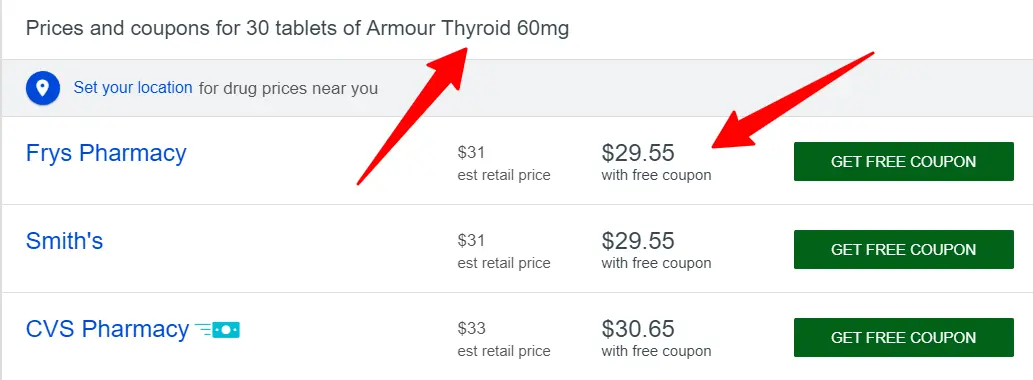
It will run you around $30.00 per month if you don’t have insurance (sometimes it will be that price even if you do have insurance).
You can compare this to other NDT formulations, such as NP Thyroid, which is around $8.00 per month for 30 tablets of 60mg:
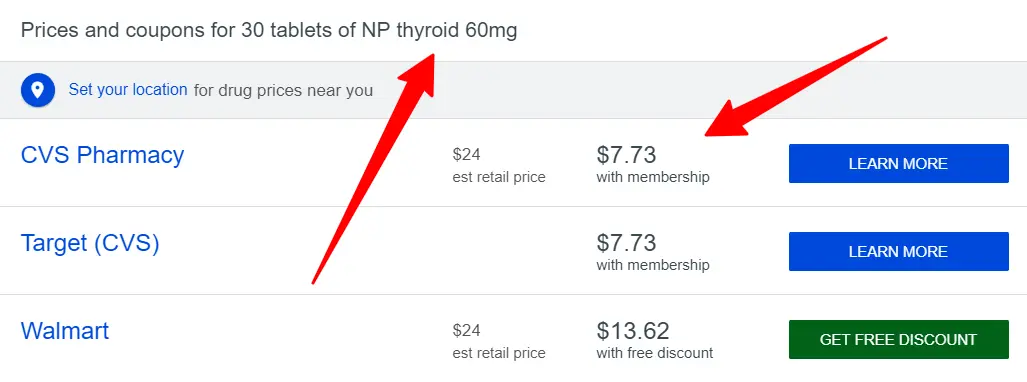
So, that’s potentially a savings of around $20 per month (assuming cash price) if you use one formulation over the other.
While price is certainly not the only thing you should consider or even the most important thing you should consider, when looking at your thyroid medication, it can still be an important factor for many people.
If you find that you’ve already tried NP thyroid it didn’t work for you then paying more for Armour thyroid may make sense.

But if you are paying just because your doctor put you on it without trying other formulations then you may want to at least consider them.
You can switch to a different formulation of NDT such as NP thyroid or Adthyza on a grain-for-grain basis.
So, let’s say you are currently taking 1.5 grains (90 mg) of Armour thyroid.
This would get you the same equivalent doses of T4 and T3 even though the mg dosage is slightly different (this doesn’t affect the amount of T3 and T4 that you are consuming).
#4. Armour thyroid contains animal products
Hopefully, this doesn’t come as a surprise to you but Armour Thyroid contains animal products.
In fact, it is sourced from the thyroid glands of pigs (porcine-derived).
Armour thyroid is created by taking the thyroid glands, mashing them, drying them out, and then ensuring that each ‘grain’ of medication contains a specific amount of T4 and T3 thyroid hormones.
The fact that Armour comes from pigs is not necessarily a big deal by itself, but it certainly should be something that you are aware of.
Why?
For a couple of reasons:
The first is that it contains animal proteins in addition to the thyroid hormones that your body needs.
These animal proteins are important because they are not HUMAN proteins.
It is possible (though it does not happen often) for your immune system to react negatively to these proteins and to trigger an immune response.
This immune response may lead to the triggering of autoimmune thyroid symptoms from thyroid antibodies or other low-grade symptoms such as headache, fatigue, etc.
This problem remains mostly a theoretical problem in that it’s something that can potentially happen but doesn’t occur in most people.
For most people, your intestinal tract and stomach acid are sufficient to completely (or at least sufficiently) break down these animal proteins so that they don’t enter into your bloodstream.
As long as your body is producing sufficient stomach acid then this is probably not an issue you need to worry about.
Also, by the way, there may also be some additional benefits to consuming animal glands beyond the benefits that thyroid hormone provides directly.
Many supplements, including my thyroid/adrenal supplement, contain what are known as animal glandulars.
These are desiccated and concentrated components of the glands of animals that seem to provide a stimulatory response in the body. They probably also contain ingredients that can help stimulate our own target organs.
You can read more about these glandulars and how they may positively impact health here.
While it may seem weird to consume the gland of another animal it’s not that weird when you consider humans have been eating the organs of animals (such as the liver) for many health benefits.
Liver, for instance, is incredibly high in Vitamin A and iron (4), and, as an organ meat, is considered to be a healthy source of vitamins and nutrients.
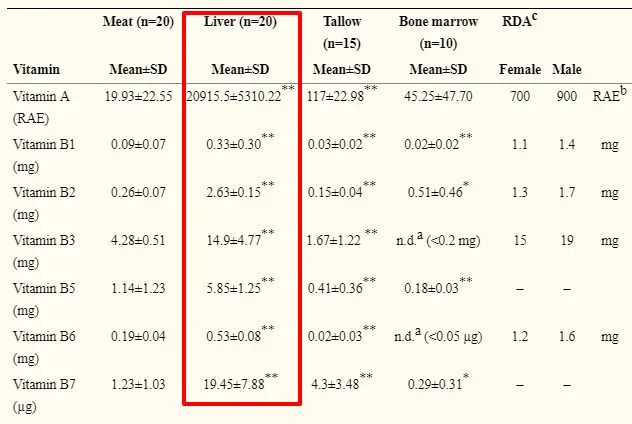
These organ meats were considered to be the healthiest part of the animal in some modern hunter/gatherer tribes.
So try to forget about how weird it is and keep your eye on the benefits.
#5. Armour Thyroid contains both T4 and T3
This one probably isn’t a surprise for many of you but it’s still worth pointing out.
Armour thyroid falls into the class of Natural Desiccated Thyroid medications.
These medications are notoriously beneficial because they contain more than just the standard T4 thyroid hormone (known as Thyroxine) in medications such as levothyroxine and Synthroid.
Armour thyroid contains BOTH T4 and T3.
Each grain of Armour thyroid contains 38 mcg of T4 and 9 mcg of T3.
This ratio is roughly about 77:23 which is somewhat close to the 80:20 ratio of T4:T3 that your thyroid gland produces naturally.
Some doctors will suggest that Armour thyroid (and other NDT formulations) should not be used because they contain too much T3 compared to what the body produces naturally.
But more recent studies (5) show that healthy thyroid glands produce around 80% T4 and around 20% T3.
Some doctors try to suggest that the thyroid gland produces 95% T4 and 5% T3 (or somewhere near that amount) but these values are not supported by more recent studies.
Why should you care that it contains T3?
I think the most important reason is that T3 is by far the most biologically active thyroid hormone (6).
It’s roughly 300x more potent than T4 at stimulating the thyroid receptors in your cells.
Pretty much everything you want thyroid hormone to do stems from the direct actions of T3 thyroid hormone.
Why isn’t it used more frequently?
Most doctors are simply not comfortable using it or feel that it is too powerful or too difficult to dose.
They can’t, nor should they try, to downplay the effectiveness of T3 in stimulating thyroid receptors.
This is probably one of the main reasons that many people do better on Armour thyroid compared to thyroid medications which contain just T4.
#6. Armour thyroid contains other ingredients beyond just thyroid hormones
I mentioned this previously in another section when I discussed that Armour thyroid contains both T4 and T3.
Because Armour is sourced from animal thyroid glands, it also contains additional ingredients which are also found inside of thyroid glands.
This includes hormones, proteins, additional thyroid hormones, and probably other pre-cursors that we aren’t aware of.
Most important to this conversation is the fact that Armour contains the thyroid hormone T2 and Calcitonin.
T2 is a biologically active thyroid hormone that is found in humans and seems to play an important role in regulating fat burn and metabolism (7).
As long as you have a functioning thyroid gland your body will produce T2 in addition to T3 and T4.
But, if you have had your thyroid gland removed by surgery or destroyed by RAI then your body isn’t producing it anymore.
For this reason, it has been suggested that Armour thyroid (and other brands of NDT) may be preferable to this patient population over T4-only formulations such as Synthroid.
Why?
Because it can be argued that Armour provides a more complete array of thyroid hormones and other hormones that the body needs.
It’s of course still possible to not have a thyroid and do somewhat well on T4-only medications, but the chances are high that you will feel even better on a T4 + T3 combination, especially one that includes the other thyroid hormones such as T2.
This concept has become more popular recently as studies have shown that people without a thyroid tend to have lower T3 levels than healthy people if they only take T4.
I suspect that over the coming years (perhaps around 10 years or so) it will be much more common for people without a functioning thyroid to be placed on a combination of both T4 and T3.
#7. It has a better track record compared to levothyroxine/Synthroid
Surprisingly, this is not only my own personal opinion but also the opinion of certain clinical studies.
Researchers have already done some of the heavy lifting for us so let’s evaluate one study to get a better idea of how people respond to medications such as Armour thyroid.
In this study (8), researchers placed patients on either levothyroxine or thyroid extract (another name for NDT).
They kept these patients on these medications for 16 weeks and then swapped them for another medication.
So some patients were placed on levothyroxine first for 16 weeks and then transitioned to thyroid extract for another 16 weeks.
The other group of patients was on thyroid extract first for 16 weeks and then transitioned to levothyroxine for another 16 weeks.
At the end of this 32-week period they then simply asked patients how they felt on the different medications.
What did they find?
They found that those people who were on thyroid extract (abbreviated DTE which stands for desiccated thyroid extract) experienced more weight loss compared to the people who were only on levothyroxine alone.
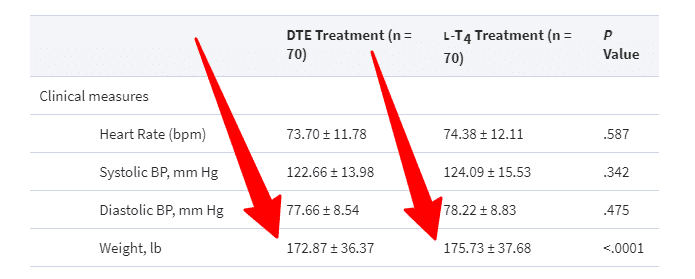
The study also concluded that about half of the people or around 48.6 percent of people had a preference for DTE over levothyroxine.
They also showed that patients lost around 4 pounds simply switching thyroid medication and had a subjective improvement in their symptoms (meaning they felt less fatigue, less hair loss, fewer aches/pains, better concentration, better sleep, improved memory, etc.).
One important factor that this study revealed was that people who are overweight and those with a higher reverse T3 level tend to prefer NDT over T4.
So if you are someone who has some extra weight to lose your body may do better on Armour.
If, on the other hand, your weight is relatively normal (or just slightly higher than you’d like), T4-only medication may be preferable.
This isn’t an exact science but something to consider.
Lastly, another important point worth mentioning is that people in this study did NOT experience any negative side effects on either therapy which suggests that Armour (if dosed correctly) is quite safe.
#8. It is not the name brand of NP thyroid
This is important to understand because your pharmacy likely considers Armour Thyroid to be the name brand for NP thyroid.
Both medications are formulations of Natural Desiccated Thyroid but they are certainly not the same.
Both medications have the same amounts of T4 and T3 grain for grain, but they do differ in their inactive ingredients.
Armour thyroid contains the following ingredients (9):
- Triiodothyronine (active ingredient)
- Thyroxine (active ingredient)
- Calcium stearate
- Dextrose
- Microcrystalline cellulose
- Sodium starch glycolate
- Opadry white
- Minor amounts of calcitonin, T1, T2, and proteins
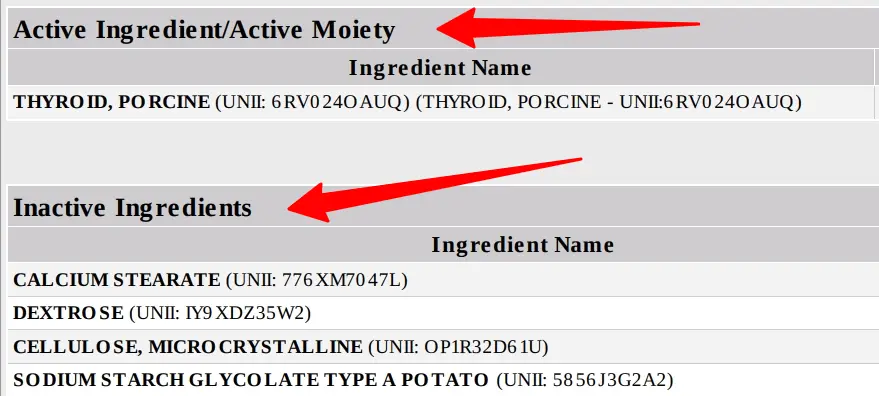
NP thyroid contains the following ingredients:
- Triiodothyronine (active ingredient)
- Thyroxine (active ingredient)
- Calcium stearate
- Dextrose Monohydrate
- Maltodextrin
- Mineral oil
- Minor amounts of calcitonin, T1, T2, and proteins
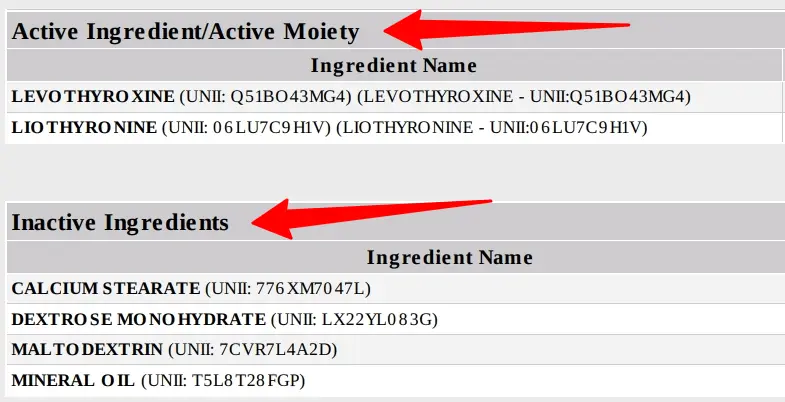
Why does this matter?
Because the inactive ingredients found in these medications may have an impact on how well you tolerate it!
Switching from Armour to NP thyroid or from NP thyroid to Armour may actually be enough to trigger the onset of hypothyroid symptoms.
You should be aware of the difference between these medications so that you know if your pharmacy tries to swap the medications on you without you knowing it.
And yes, pharmacists can do this because these medications are considered “bioequivalent” (10) from the insurance perspective.
So if your insurance wants the cheaper formulation (which is NP Thyroid), your pharmacist can make the switch.
If you want to ensure that you get Armour thyroid filled you may need to have your doctor write “dispense as written” on your prescription.
In addition, you can make a special request for Armour thyroid when you go to pick up your medication and just pay the cash price.
Don’t be afraid to do this, especially if you feel worse on NP thyroid, because the cash price is typically around $20-30 per month.
It may be worth the extra expense if it dramatically improves your quality of life.
#9. Transferring from levothyroxine to Armour requires dose adjustments
If you are switching from levothyroxine or Synthroid over to Armour thyroid then you must consider how to adjust your dose during the transition.
Unfortunately, it’s not as easy as just saying “Well, I’m taking 100mcg of levothyroxine so I will need 100mg of Armour thyroid”.
Why is the transition so difficult?
The main reason has to do with the fact that Armour thyroid contains T3 in addition to T4.
And, because T3 is so much more powerful when compared to T4 it’s difficult to pinpoint what an equivalent dose would be.
Most standard textbooks will give you a conversion chart that looks similar to this:
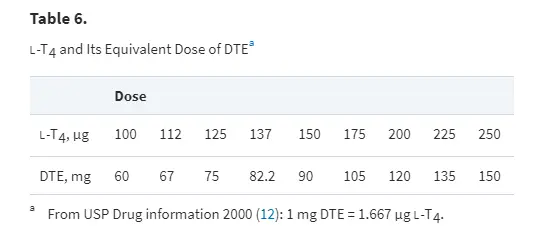
The standard conversion states that 100mcg of Synthroid/levothyroxine is equal to 60mg of Armour thyroid.
But there’s one big issue with this conversion chart…
Most people who go by this conversion chart end up with a rising TSH and persistent symptoms of hypothyroidism when they transition.
These symptoms seem to suggest that using this chart results in insufficient dosing.
In fact, newer studies (11) suggest a conversion that is more similar to this:
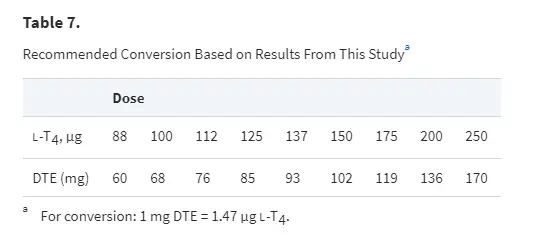
This chart suggests that 100mcg of T4 is equivalent to 68mg of Armour thyroid (which is more than the “standard” conversion listed above).
My own personal experience suggests that 1 grain of Armour thyroid is probably closer to 75mcg of T4.
Because there’s quite a bit of debate about how to transition appropriately, just be sure that you give your body enough time to acclimate to the changes and be sure to monitor your thyroid lab tests.
Also, don’t be alarmed if you suddenly increase some worsening symptoms upon transitioning.
This will most likely be temporary and is probably related to your dose, especially if it is insufficient.
#10. Armour may impact your thyroid lab tests differently than other thyroid medications
Lastly, you should be aware that Armour thyroid causes some changes to your thyroid lab tests which are not necessarily the same as levothyroxine.
Because Armour contains T3 it tends to cause a more pronounced and powerful drop in your TSH.
It has been estimated that T3 is roughly 3-4x more potent (12) than T4 at reducing the TSH.
This may cause more of a drop in your TSH than you are used to with other T4-only medications.
In addition, because it contains T3, Armour will cause a more pronounced increase in your free T3 levels.
It may also cause a drop in your free T4 levels as well.
This pattern may be confusing to newer patients (and plenty of physicians) so it is something you should be aware of.
The pattern itself is not necessarily an issue but it may make interpreting your lab tests slightly more difficult.
To recap, you may find the following changes to your thyroid lab tests when transitioning to Armour thyroid:
- A more pronounced drop in TSH compared to T4-only medications.
- A more pronounced rise in free T3 levels compared to T4 medications.
- The potential for a drop in free T4 levels (T4 medications tend to raise this value)
- The potential for a drop or rise in reverse T3 (depending on the situation)
- A more pronounced rise in total T3 levels
- The potential for a drop in your thyroid antibody levels
*Note: These are only rough guidelines and may not apply to all patients.
Conclusion
Armour thyroid is a great thyroid medication but it’s certainly not the only game in town.
I find that Armour thyroid is a great option, especially for patients who do not have a thyroid or for whom their thyroid has been destroyed.
This is probably because it contains special ingredients and thyroid hormones not found in other formulations.
But, that doesn’t mean it won’t or can’t work for other patient populations as well.
I find that Armour (or other formulations of NDT) represents a GREAT starting point for many thyroid patients.
Now I want to hear from you:
Are you someone who is currently using Armour Thyroid?
Are you someone considering using Armour Thyroid?
If you are taking it, how are you responding?
Do you feel your dose is adequate?
If you are considering it, what things are preventing you from using it?
Leave your questions or comments below!
Scientific References
#1. https://reference.medscape.com/drug/thyrolar-liotrix-342737
#2. https://www.ncbi.nlm.nih.gov/pmc/articles/PMC5974034/
#3. https://www.ncbi.nlm.nih.gov/pubmed/8808101
#4. https://www.ncbi.nlm.nih.gov/pmc/articles/PMC3417664/
#5. https://www.ncbi.nlm.nih.gov/pubmed/12915350/
#6. https://www.ncbi.nlm.nih.gov/pmc/articles/PMC4699302/
#7. https://www.ncbi.nlm.nih.gov/pmc/articles/PMC4272398/
#8. https://www.ncbi.nlm.nih.gov/pubmed/23539727
#9. https://www.allergan.com/assets/pdf/armourthyroid_pi
#10. https://www.ncbi.nlm.nih.gov/pmc/articles/PMC4157693/
#11. https://academic.oup.com/jcem/article/98/5/1982/2536971
#12. https://www.ncbi.nlm.nih.gov/pubmed/402379
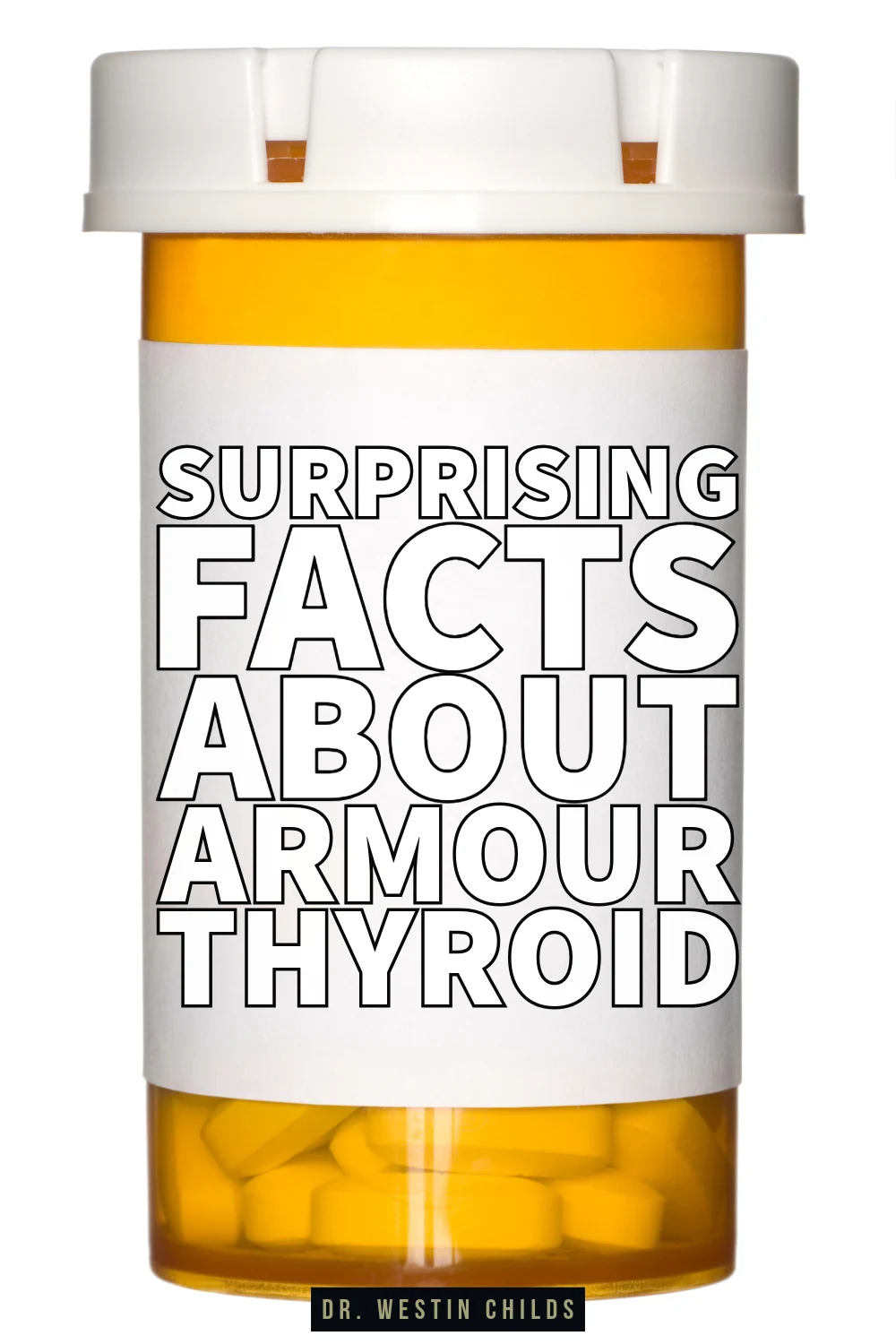
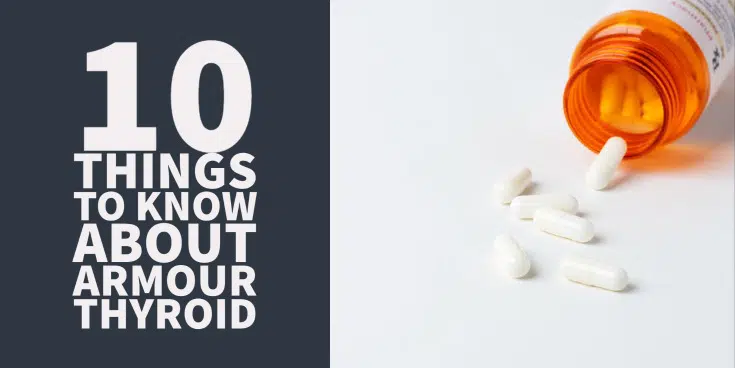
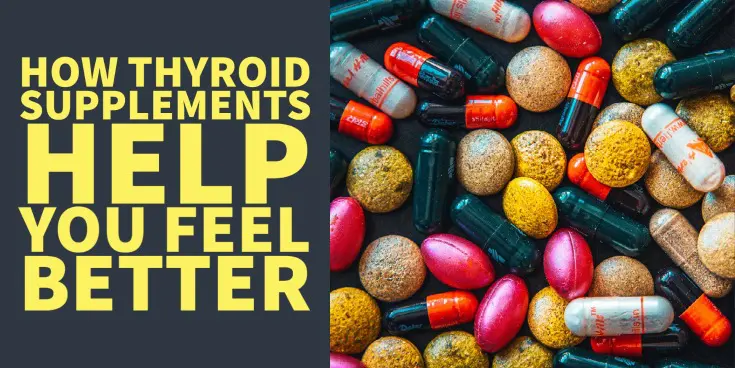
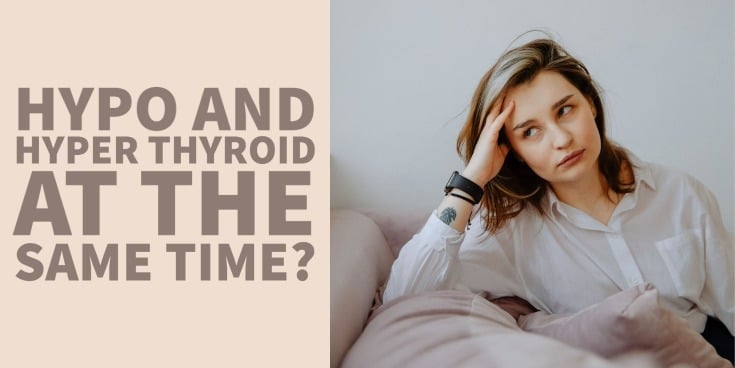
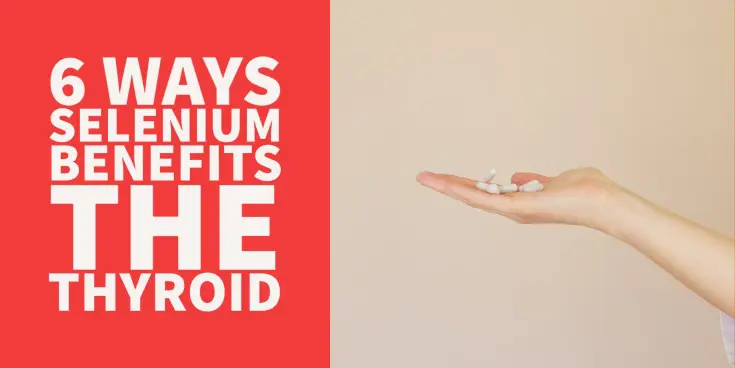

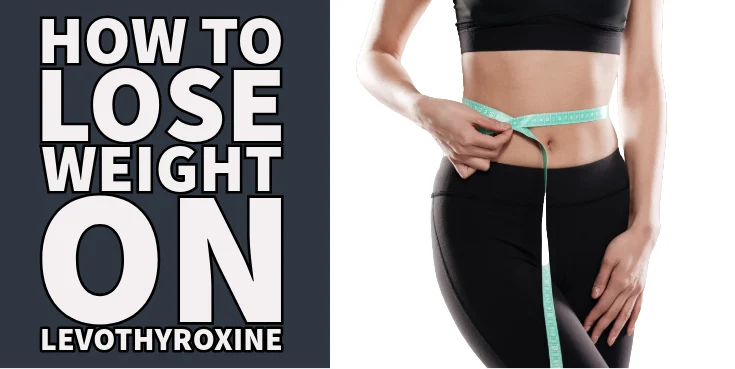
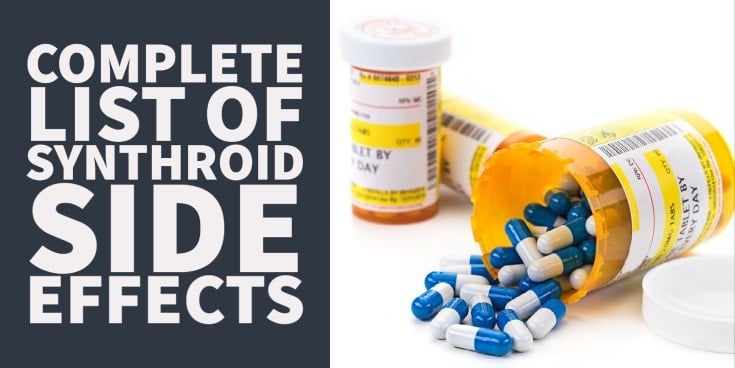

Started Armour a month ago. T3 was below range, Reverse T3 was above the range. I feel worse on it. Dr is switching me to T3 only to see how I do which he is only doing because I suggested after binging on all your great info. Appreciate all the info you put out. I get more clear info from you over all the Drs I have seen year to year. Now to just get whatever undiagnosed autoimmune disease under control. I look much younger than I am and although T3 is low I am very lean and in good shape. So every Dr assumes I am healthy. Sick of hearing why are you here your young and in great shape. And then they have no answer and just refer me to the next Dr.
Thank you Dr. Childs for yhis explaination in laymens terms. I have had my primary care physician attempt to switch me over to levothyroxin for over 3 years now because of the potency of the T3, he thinks my t3 is supressing my t4. Even though I felt fine on 60mg of armour he reduced me down to 45 a day alternating 60mg and 30mg daily I started in with sluggish digestion and weight resistance, this has been going in for 3 years ti where i found out through live cell analysis that I have methylation problems with my liver. I recently found family practice physician who accepts patients on armour thyroid. It will be interesting to see if she raises it back up. It had been extremely hard to see me gain back 30lbs. I’m on a natural detox plan to balance out all my hormone levels on a cellular level to fix the damaged cells and methylation and restore proper metabolism on a cellular level. My 1st month I have lost 9lbs and still dropping it off.
Hi Sherry,
Happy to do it! And thanks for sharing. I wouldn’t focus too much on your free T4 level if you are otherwise feeling fine.
My recent lab work shows that all of my thyroid levels (TSH, T3, T4, and such) are all in normal range except that I have a slight elevation in my TPO antibody. My provider wants me to start 60mg of armour daily. I’m hesitant to take it seeing that all of my other thyroid levels are pretty much in the middle of their normal ranges. How will taking Armour affect my other already WNL levels?
Hi Missie,
It will lower your TSH and most likely increase your free T3 and free T4 levels depending on the dose. You should never use thyroid medication based on lab tests alone, though, especially if you are feeling fine.
My endocrinologist says it would be too difficult to regulate Armour. I am currently on a Levothyroxine dose of .075, 6 days a week. She has steadily decreased my Levothyroxine over the past 9 months. I feel worse now then I did last October—anxious, unexplained sweating, hair loss, achy joints, heart palpitations. I’ve about had it. Would Armour be an easy switch?
Hi Barbara,
Most endocrinologists believe that NDT is somehow more difficult to regulate compared to T4 but this just isn’t the case. I think it’s used as an excuse so they don’t have to try.
But, to answer your question, the switch isn’t always an easy one. Sometimes it is and sometimes it isn’t and there just isn’t a great way to tell if it will be before hand.
My question is: WHY would anyone be put on ANY thyroid meds for “6 Days/week”⁉️
The normal human thyroid doesn’t take a DAY OFF, every week‼️♀️
Hi Susan,
I would never do it but other doctors do that sort of thing all of the time due to the long half life of T4. And, trust me when I say, doctors don’t care about what the normal thyroid gland does because if they did then everyone would get T3 🙂
After being on armour for years- factor three kids later and I admit my over all health a bit neglected (but otherwise fit)… My lab work is showing LOW T4, HIGH T3 and TSH of 12! It’s the TSH piece that has me stumped. Any insight?
Hi Jennifer,
Please see my most recent response to you.
I tried synthetic but I had to go back to Armour Thyroid. my insurance does not pay for it and it’s about $60 a month but otherwise I would have to spend some time in a rest home because I just couldn’t function.
Hi.. call Armour and they will help with the cost. I was unemployed for a while and I actually got my prescription free for a few months.
Where did you find the Armour number? Please and thank you.
Kathi
I had these symptoms with low thyroid. So severe a heart specialist wanted to operate on my heart! I had severe LOW! Hypo thyroid.
With thyroid regulated no-more symptoms.
Now my naturethroid is not available. I had been perfectly well for many years.
A switch to armor has made me lose hair, gain weight, feel sick, dry skin, tired, heart palpitations-all low thyroid symptoms. After 6 weeks now my blood work-thyroid levels are all severely jacked up!
But showing hypo symptoms.
Same for me. Totally suppressed TSH, fT4 higher than fT3 but both near (but under) mid-range, high reverse T3, hair falls out by the handfuls, weight gain with a LOT of body-wide edema. Energy tanked. Depression high. Body wide pain levels almost intolerable. Naturethroid worked great until 2018 recalls. NP worked good until 2019 recalls. Levo with added T3 does NOT work. Currently on Armour for over a year with all the above symptoms and blood work. If I try to raise the dose, my heart palpitations get worse. My red blood cell count and hemoglobin are now high due to lowered oxygen levels. I am also about to give up. Doctor now treating me has also given up and recently told me, “you need to find someone else because I can’t seem to help you get better”. RAI 30 years ago killed my thyroid completely and my life has been hell ever since.
Hi Barbara,
I was on Levothyroxine for 30 years and at age 50 I asked to switch to Armour. I had no problems transitioning and boy do I feel so much better. The only problem is my T3 is high. I am so glad I switched.
Kathi
Dr Childs,
You mentioned a potential increase (or decrease) in Reverse T3 after switching to Armour. What do you think the causes are of an increase and any way to combat it other than switching medication?
Many thanks!
Hi Dsharp,
The increase would be due to the fact that Armour contains T4 which is a potential substrate for rT3 production.
In 1997 I had to take radioactive iodine for Graves disease. I have been on all different thyroid medication and doses trying to feel as good as I did before thyroid disease and get my levels corrected. I was prescribed 180 mgs of Armour Thyroid by a holistic doctor recently and I was starting to feel halfway decent. This doctor has since moved and so I went to an endocrinologist. He feels that dose is too high and it is not good for my heart because my TSH was out of range. My Free T3 & Free T4 was in range, but very low. He now has me on 135 mg of Armour and I feel terrible (I slowly weaned off the higher dose). I see him again on the 27th of this month. Is it true the higher dose will affect my heart even though I had no hyper symptoms? I thought if your T3& T4 is in range then you are not taking too much thyroid medication. Your thoughts?
Hi Dr. Childs, April 10, 2019, I had a total thyroidectomy, papillary thyroid cancer 3 nodes removed. Left vocal chord paralyzed, but slowly coming back. Put on Levothyroxine 100 mg. Have conditions of unable to lose weight, intolerance to heat, excessive sweating (like really bad), blurred vision, headaches, and brain fogs. Went to eye doctor and vision has definitely worsened since last year. The endocrinologist has taken me off of thyroid medication for 3 wks and going to test my thyroid globin levels. If cancer is back will zap it. Will be back on thyroid medication in 3 wks.
Hi Dr. Childs,
I have been taking Armour Thyroid for about 10 years. I started with Synthroid but still felt awful. My endocrinologist said my levels were fine and to keep taking the meds. I found a natural doctor who prescribed the Armour and it changed how I felt… I felt normal again. I had a lot of energy and my weight stabilized. I started at 90 mcg then eventually now at 120 mcg. I am a 58-year-old female who is post-menopausal. I have experienced a significant issue with hair loss. Arms, legs, eyebrows abs now my head. I wondered if the Armour would cause this but my doctor thinks that I am deficient in another hormone. Overall, I still do well on Armour.
I was diagnosed with a low thyroid when I was 16 years of age and put on armor thyroid. After about 30 years most doctors would only prescribe me the synthetic hormone level thyroxine. It took me a long time to find a Doctor Who knew about armor thyroid because I always felt better on it and have been on it now for six months. I am back to feeling normal, my weight has decreased, And I feel normal
Hi Alison,
Glad it’s working for you! Thanks for sharing.
Presently taking NP 120mg-2grains.
Having problems with weight gain.
Age: 57.
When switching to Armour, what mg should I start with.
Hi Tangie,
I would check out this article for more information on that topic: https://www.restartmed.com/thyroid-medication-dosage-chart/
I’m presently taking 15mg of NPThyroid, dr is switching me to Armour 15 mg. Does this sound like the correct dose? Thanks!!
I am 52 years old. From the age of 46-49, I self-diagnosed as going through menopause and having arthritis (my mom has 2 types- made sense to me). I went to a doctor for my allergies who is an endocrinologist and she asked some questions. The end result she completed a full thyroid panel and diagnosed me with Hashimotos. I was really surprised because 18 yrs prior I had hypothyroidism after my daughter’s birth, but through prayer and God’s healing power I was able to quit taking my Synthroid. I had my TSH checked through the years and it always came back normal. So rolling forward I felt amazingly improved after I started taking Armour thyroid. No joint pain, nodules are smaller, etc. I have struggled TREMENDOUSLY with brain fog, weight gain and low energy. Of course doctors are busy and you are left to figure out how to help yourself get better. I have been drinking Kombucha and Kefir plus taking a good pro/prebiotic and FINALLY I am getting relief in my weight (have lost 13 lbs 2-2 1/2 months). I seem to have more energy, but get tired especially in the evening when I need to get more done at home after working all day. When I am tired, brain fog is HORRIBLE! So I try to rest better by getting more of it and better rest by using Melatonin. I thank you Dr. Childs for all of your informative articles.
My dr. took me off of Armour thyroid because she said it can damage the heart. I do have a heart valve leak. I was on Armour for many years, and was put on it by another dr. I actually asked for it. However, my dr. now is an osteopathic dr. and does some manipulation, so she knows a little more about muscles. What do you think? I do have trouble losing weight now.
Hi Toni,
It can only damage the heart if you use excessively high doses.
I was on armour when first treated for hashimotos 25 years ago, I didn’t feel good on it, especially regarding depression and brain fog. I feel much better…more like myself…on combo of synthroid and cytomel, although I do have complaints of hair falling out and very low body temp.
Thank you for all the information! I had wondered why my TSH is so low on my blood tests. Glad to know it’s expected!
Hi Leena,
No problem and glad you found it helpful! I would also point out that it doesn’t ALWAYS suppress the TSH (but it is not uncommon).
Hi dr Childs,
How do you know if you have antibiody issues to armour thyroid?
Is there a blood test to find the antibiodies?
Kelly
Hi Kelly,
Yes, you can test thyroid peroxidase antibodies and thyroglobulin antibodies (they are the same antibodies present in Hashimoto’s).
Dr. Child’s
I was just recently on 2 grains of Armour Thyroid until I had endocrinologist remove me from it (I had severe hand shaking) after a year and he then put me on 100mg synthyroid and 10mg cytomel and now my Cholestrol has jumped almost 30 point in 8 weeks and the Endocrinologist says my change/dose have “nothing” to do with thyroid meds/dose, I don’t believe this since I’ve actually read lots of medical publications talking about uncontrolled hypothyroidism and cholesterol levels rising.
In fairness my cholesterol has never been good my entire life being overweight and thin its never been good. I have a few autoimmune diseases and now no thyroid and inject monthly with immunosuppressive drug.
Is armour better for keeping cholesterol down? It’s sad to say I survived ovarian and thyroid cancer to only go out with heart disease…its never ending.
I was on synthroid for about 10 years, struggled with weight issues from the time i was diagnosed at 45 yrs old, in 2007, continuing to gain weight, regardless of how much I dieted. In 2016, my tsh dropped to .04 and my endo tried a few things but couldnt get it to go back up. I moved and with my new dr I asked about armour and gave it a try in late 2017. My tsh was at 3.55 when i started taking 90mg and then dropped to .2 after i went up to 120mg. Its been around .01 and .05 since then and my dr keeps saying i am hyperthroid now. I asked her to test my free t4 and free t3, and both of those are at the lower end of their ranges…free t4 at .65 and free t3 2.9. I lost 15 lbs my first year on armour and as a result many of my other labs improved..cholesterol, ast, alt, etc. Is .01-.05 ok, for my tsh with armour? Especially given my free t3 and free t4 levels? I also seem to be getting some brain fog…are any of the ndts seeing better results than others with this?
Hi K,
It depends on a number of factors including your age and menopause status. I would check out this article for more info: https://www.restartmed.com/suppressed-tsh/
Thank you! I read the article. I am post-menopausal, 57 and my free t3 and free t4 are low end of ranges. With a tsh of .01 to .05, what else can I try? Would different NDTs have different outcomes? My endo just didnt have an answer why the tsh would be low, and the ft3 and ft4 would be lower end of range. I have quit losing weight, and in fact am up 5 lbs! I do take both calcium and low dose estrogen. K
You didnt mention that if you have a pork sensitivity then NDT wil make you crazy. I had to go back to compounded T3 and t4 . I had severe anxiety and insomnia on NDT for years. . My pork sensitivity was mild.
Hi Karen,
They are bovine derived sources of NDT that you can use if that’s the case.
Do you have any thoughts on the recent reformulation of NP Thyroid – apparently it is no longer working for many people. Have you noticed an impact on your patients and do you still recommend NP Thyroid? Thank you!
Hi Cindy,
I still recommend it. I’ve noticed a small difference in some people but there are plenty who still do very well on it.
I have been trying to find other natural thyroid meds but nature throid and armour are the only two available. I remember in one of your articles you stated that WPthyroid had fewer fillers and additives, but i have had no luck at all in finding it, and have been asking pharmacists in my area and online for two years now. Do you know where it can be purchased? I’m still losing a lot of hair and I was hoping that it would resolve if I tried the WP but I know it’s a crap shoot.
Thanks, Doctor Childs! Your information is very helpful and I very much appreciate it!
Hi Adrienne,
WP thyroid and Nature-throid have both been very difficult to get while they have been on back-order. I still believe that WP thyroid is the best but my patients haven’t been able to get it for over a year or so. Hopefully, they can get things back in stock come 2020.
I was using WP thyroid for more than a year. Last time I was due for a refill on my prescription, I was told multiple times that it was on back order. I contacted the company and they said production was increasing and distribution would be happening soon. Meanwhile, I learned that CVS has decided to no longer fill WP thyroid prescriptions!!!! My pharmacist did not even know this.
I switched to NP thyroid, which was available through Costco pharmacy.
Hi Marcia,
Unfortunately, it is still on backorder (according to the information I last saw). CVS also does not carry NP thyroid but there is a workaround there as well (I have a blog post on it). There are still ways to get your medication you just have to be very creative and persistent.
What do you think of armour versus compounded equivalent of t3/t4?
Hi Sara,
Both can work well, I wouldn’t say one is necessarily better than the other.
I have been taking Armour for about maybe 9 months now and tho the Dr says my numbers all come back good I don’t feel like they are good. I’ve been on thyroid pills for 50 years. I took synthroid for a lot of years but it stopped working on me, I was on Levo, and then nature, then here in Texas we couldn’t get it so I went in Armour. I just feel crappy. I also have low sugar.
I have been on and off of one type or another of thyroid since I was 11 years old. Some Dr believe in it some don’t. When 11 I was put on Armour the only thing that changed was I began to have regular bowel movements. I was on and off various thyroid meds with no dr taking it very seriously. I was so exhausted, gained weight and living like a zombie. It cost me my marriage and I had to hide my fatigue to keep my career as a engineer going. It was really bad after having my one and only child. Today I am on Armour again and immediately I felt better. I tried a different NDT for years and not much help for me. I also found taking progesterone is a wonder drug for me. I read low thyroid usually means low progesterone. I tried OTC nature source raw thyroid also helped me. It is a blend of Thyroid Tissue, Adrenal Tissue, Pituitary Tissue, Thymus Tissue, Spleen Tissue, Any thoughts on why this OTC supplement would give me such a boost? I have tried using other supplements and another puzzlement is any thing that effects GABA makes me overwhelmingly fatigue, like maca. Maca is recommended for balance, Ashwagandha does the same thing, I become fatigue within 2 to 3 days of using. Any thoughts on why? I have tried different brands with same results.
After 14 years of taking synthroid and a compounded T3 (25mg), it wasn’t working for me… weight gain, sensitivity to foods etc. My doctor suggested WP and for the first time in 20 years, I felt I had my life back. I used it for a year and a half, and then, in Aug 2018, I was not able to get it anymore. My doctor switched me to Nature thyroid, and 10 days after using it, I started huffing and puffing, and having difficulty breathing. Never having experienced asthma, I didn’t know what was wrong with me. I developed what the doctors said was pneumonia, but I had terrible reactions to the antibiotics, to the inhalers, etc. I was a mess. After months of constant bronchospasms and my doctor saying that they couldn’t be related to the Naturethyroid, I stopped taking it for 1 day, and had such relief…. in the end, I switched back to synthroid. I loved all the wonderful effects of taking WP, but Naturethyroid gave me asthma. Then, come March, 2019, my doctor got some WP. To my great disappointment, I had the same bronchospasm effect.. something was wrong with WP too. I did take it for 3 more months, at a lower dose, but then I began to have hypothyroid symptoms. I don’t believe it’s the fillers and inactive ingredients. I think it’s the source of thyroid gland. Now I am back on synthroid /compounded T3…. I don’t feel great, weight issues are huge, and I do have to use inhalers. I’m wondering if Armour might be different ?
I signed up for a telephone consult with you, but I can’t get all those blood tests as I am in Canada and doctors here have to write out a requisition for blood work. I also fried my computer where I had archived that order. Is there any way I can get a reimbursement for that consult? It was $800.00 candian, so not a small amount. I would really appreciate a reimbursement.
Hi Anna-Maria,
You could try Armour to see if it works, but you might also want to try bovine-derived NDT as well. I don’t know much about the consult you are referencing but if you reach out to my team I’m sure they can help you out! Just email us at hello@restartmed.com and we can help.
Newly diagnosed with hypothyroidism. I am on compounded Armour. Only symptoms I had that led me to a Dr. were hair loss and not being able to sleep. I don’t feel any different on Armour, I’m still not sleeping very well but the hair loss is less. Like I said, I never felt bad, and now I don’t feel any different. I think we caught this in the early stages. All of this is super confusing to me.
Hi Kristel,
If it’s in the early stages then you might be able to get away with supplements and lifestyle changes (diet, exercise, etc.). You should also test for Hashimoto’s antibodies (thyroid antibodies) to ensure that you don’t have autoimmune thyroiditis which is a common cause of hypothyroidism.
I have been on Armour Thyroid for 25 plus years with 3 month trials on other thyroid meds. I went back to the original Armour Thyroid…I felt wonderful after starting and have so much more energy. When on the others, experienced hair and eye brow loss, severe dry skin and itching, low energy and fatigue. Have to keep checking the script as it is sometimes substituted for others at the big box pharmacies…even though my physician has noted to dispense as written…
Hi Mary Anne,
Ahhh yes, the good old pharmacy switch. I find that this happens a considerable amount by pharmacists that don’t understand the impact that fillers/binders have on certain patients.
Hello,
I have had a total thyroidectomy… I was on 137 of Synthroid and 10 of Cytomel but didn’t feel well. My doc switched me to 120mg of Armour and I felt better but not as good as I had hoped. Then he put me on 150mg of Armour and I’ve started to finally lose weight for the first time in years (5bls in 6 weeks). I feel great on the 150mg but the doc says because my TSH and T4 is 1 – 2 points over the high range I have to go back to 120mg and take more estrogen. Shouldn’t I be paying more attention to how I feel and the weight loss versus some random lab range? FYI I am post menopausal, have autoimmune issues and reactivated EBV.
Hi Donna,
The lab tests have value but I don’t think they should be used as the only metric to determine if you need to lower your dose. You also want to pay attention to other metrics such as heart rate, metabolism, symptoms, and other lab tests such as reverse T3.
Dr. Child’s,
Do you know what would cause a small percentage of people to not do well on NDT’s? I took Naturethroid for six years without a challenge and during the shortage was switched to WP and then back to Naturethroid in 6/19 when my problems began. Major hair loss, joint pain, brain fog and fatigue. Switched to NP Thyroid which helped the hair loss but not the rest (and the pills smelled terrible on the second refill). Then tried synthetic t3/t4 and all got better but left with a headache on crown of head. Now I have been on Armour for a month and all seemed better but my hair is getting frizzy again and started to fall. Not sure if Armour isn’t working for me or it is a dosing issue. Blood test last week showed not optimal yet but going slow.
Hi Lynn,
There are many reasons why people don’t tolerate NDT ranging from dosing problems to interactions with binders/fillers to other reasons that we probably don’t fully understand.
Thanks, for your advice on Armour. I was on Synthroid for about 6 years and it started to make me feel terrible (I have Hashimoto’s) it was causing vertigo off and on! Now after reading about Armour, I decided to try it; my Endocronolgist had no problem changing. After 3 days on Armour my vertigo disappeared! I take it at night and feel much better!
Hi Stephanie,
Awesome! Thanks for sharing 🙂
Dr. Childs – I have been on Armour for 2 years. It has been life changing for my deep existential state, lack of physical and mental energy and unrelenting feeling of coldness. I take 60mg in the morning and 30mg in the afternoon, all with 30mg tablets. For some strange reason, I don’t respond to 60mg tablets, so always stick to 30s. In the last 3 weeks, the 30mg tablets have also stopped working. I just got another refill to see if the others had maybe expired. But not luck. I continue to have substantial hair loss, gained weight, constipation, feel cold constantly again, have little energy and see the dark mood returning. When I originally ran into problems with Armour 60mg tablets, I tried to switch to a synthetic. I tried Levo, and Synthroid with Liothyronine but still had all my symptoms so returned to Armour. I have gone up to 90mg in the morning and 60mg in the afternoon and still feel no relief in my symptoms.
My diet, lifestyle and stress levels are really good and haven’t changed in the last year. Any theories as to what could be causing my lack of response to my Armour or ideas what I could try?
Thank you,
Christina
Hello Dr. Childs
Switched from 88 mcg Synthroid w/ 20 mcg Cytomel per day to 120 mcg Armour Thyroid. I am feeling hypo and having a hard time focusing, severely fatigued, shortness of breath off and on with inability to lose weight. Does this mean I cannot take Armour or is it my dose may be off? Doc said this is the transition dose for the Armour but why am feeling so off? concerned the transition is not correct for the amount of T3 I was on. Thanks for all your research we that suffer have a hard time researching and figuring out what we need.
Hi Tara,
No problem! And you can’t really say whether or not the medication is working without testing your labs after you’ve been on it for some time.
I have been taking Armour for at least 10 years. I did great until they changed the formulation years ago and experienced muscle pain throughout. I adjusted after a month. In the last 6 moths something changed. I have severe tenosynovitis and arthritis symptoms. I looked up the inactive ingredients and noticed there is dextrose listed. I have an issue with corn among other food allergies. Currently gluten free. Mostly dairy free (only occasionally eat sheep/goat cheese), avoid corn, soy, etc. Considering compounded thyroid medication to see if there is some relief.
Hi Allison,
It’s certainly worth a try but you should be aware that the actual amount of dextrose in each capsule is quite small so it could also very well be something unrelated to your thyroid medication.
I’ve been on NP THYROID for two years then they change the formulation of it. I am going to go back to armor in one month I sure hope that it works well for me i used to be on it a few years ago but it did cause some heart palpitations so I’ll keep everybody informed.
i do not have a thyroid (cancer 20 years ago) and was recently switched from Tirosint 137 and cytomel 5 to armour (taking two 75 + 25 grams) my TSH jumped from 0.1 to 8,7.
I am really concerned. Should i be looking for a new doctor or is this a normal process of adjustment? (this is a supposedly renowned one around southern ca and not cheap…)
Since doing radioactive iodine I was told i need to keep my tsh suppressed, so seeing this this high is freaking me out. Thoughts?
Dear Dr Childs,
I am of the Muslim faith and would prefer a desiccated thyroid medication that is not ” pork-derived ” like Armour Thyroid which my CNP at my request recently put me on (30 mg) in addition to Levothyroxin (100 mcg) which I was on for several years and on it’s own did not help my extreme fatigue and weight gain problem despite eating healthier and exercising. I am getting an upset stomach with the addition of Armour Thyroid to the Levothyroxin but I am loosing weight, thank God. Is their any non-pork derived desiccated thyroid medication you recommend and am I better off on this combination or is a switch to total desiccated thyroid better? Thank you for your anticipated response. God bless.
I am on Armour Thyroid. I was originally on Synthroid. I changed meds because I didn’t like being given an additional medication for each symptom I stated like depression I was given an SSRI medication and soon those meds would not work for me. Sleeping pills for sleeping problems. Etc. Etc. I am on 90mg of Armour. I am still having hair loss and mood problems but now there is another really bothersome symptom: cold. It doesn’t matter what I eat be it ice cream or hot off the stove: I will freeze. I will get extremely cold. Sitting here writing this I am getting cold. The house can be 75 degrees (F) and I will freeze. I do have high ferritin levels and have seen a hematologist for it. But even they are saying it is my thyroid. I am tired of being cold. I am also gaining weight like crazy and I only eat TWO meals a day. I am somewhat of a picky eater due to my autism which we think my thyroid caused that too. You see my mom and I learned that I have a size three thyroid and a normal is a size 5.
I am currently taking 100
Mcg of synthroid and 15 mcg of cytomel. I am working with my doctor who is also a D.O. And I want to try and switch to armour. Would I still take the cytomel with the armour?
Because of the widespread recall of Nature-throid, I have been substituted Armour. First thing I noticed is it smells like cat spray. I’ve googled it and the only answer I’m seeing is that it can smell like pork. But does pork smell like cat spray or do I have a rancid bottle?
It also has a very sweet taste. Nature-throid has no smell and taste like medicine.
Is the taste and smell normal?
I am a 70 year old female post menopause who has been taking armour thyroid 30 mg for one year. I am normal weight. 130 pounds 5’7″. I would like to stop. I do not like taking any medications and this is the only one I take. Having some hair loss, heart palpitations, fatigue, mood swings, etc. I am still very athletic and active. Can I just quit cold turkey? I take an iodine supplement and try to eat thyroid supportive foods. Thanks!
I am just now considering this product. I have been on synthroid for years. Last 4 years doesn’t seem to be helping and doctor seems unconcerned. Symptoms are back. Tired all the time. Hair thinning. Can’t focus. I only take .25mcg which doesn’t seem like a lot to me but doctor never changes dosage and says results are fine. This is from the family physician. What would be a recommended dosage. ? I have asked her about it before but she doesn’t prescribe . What are your thoughts? Desparate at the point. Thanks. Karen
I am now on Np Thyroid 120 Mg tabs says Np thyroid 120 tab Acel.
I have no thyroid gland at the beginning (1999) I was taking 175 thyroxine . As of the last 5 years I was taking 145 ? Mg & 125 Mg thyroxine. New doctor (not an endocrinologist) started messing with my thyroid meds as why I am now 120 Mg of Np thyroid.
I do not feel so good. stomach issues dry hair ,splitting nails, heart papilations etc ,I am sure I am hypothyroid now and the stuff smells weird . (weight gain too) I actually never had any issues with Levothroxine , this new doctor thought being I had weight gain the Np would be best. Personally I don’t think he knows his stuff. Requested a referal to a endo. I am 70 years old 4’11” 145 lbs to heavy!
I am curious about your statement regarding Armour Thyroid and its animal products, porcine I am assuming. You go on to mention the other NDT available such as Nature-Throid, which unfortunately has now been recalled, but it also contains animal products, porcine. Is there a particular reason you pointed out that Armour has animal products?
I take a combo of levothyroxine 75mcg and armour thyroid 30 mg
This combination works best for me and keeps all symptoms of thyroid removal 13 yrs ago in check. New doctor changed me to 100 mcg levothyroxine only for 2 1/2 years – I gained excessive weight at 5 foot tall 63 yrs old which was not good as well as the return of poor temperature regulation, foggy brain, etc. 6 months ago I returned to old doctor willing to prescribe the combo my managed care plan refuses to and my weight and symptoms are stabilizing once again. Why do Kaiser doctor’s refuse to prescribe armour thyroid? Excuses include – risk of heart palpations (never had any), inability to regulate levels, and they do not carry it. So now I pay out of pocket and see my old doctor who will keep me on what works best for quality of life.
Hi Deena,
It has to do with the standard of care. Most doctors just simply don’t believe that other thyroid medications are helpful or necessary beyond levothyroxine. If that were true then websites like mine wouldn’t need to exist.
I was on Armor thyroid for several years, loved how I felt and lost 60lbs in the process. However, I developed thyroid cancer, had thyroid removed and the endo will not prescribe me the medication(and said it is not recommended after my cancer). I tried levothyroxine, synthroid and now tirosint since the surgery and the weight has started coming back and i feel drained. Is it possible it is bad or not as beneficial after cancer?
Hi Sonia,
NDT is just a medication that contains T3 and T4 thyroid hormone. There’s nothing inherently bad about it for those with thyroid cancer or those with any thyroid disease, for that matter.
Dr. Westin,
What on earth does this mean:
“I find that Armour thyroid is a great option, especially for patients who do not have a thyroid or in whom their thyroid has been destroyed.
This is probably because it contains special ingredients and thyroid hormones not found in other formulations.”
I WOULD LIKE TO KNOW WHAT SPECIAL INGREDIENTS AND THYROID HORMONES Armour has that are not found in other formulations?? This is EXTREMELY important to me since I’ve been on Armour 90mg for close to 6 weeks and have never felt WORSE! I had an MI in 1998, cardiovascular disease, and in the last few days chest pain. This may NOT have anything to do with my heart since I have GERD, Nutcracker esophagus, and a hiatal hernia. After reading all of the medications I should NOT take, I feel I’m in real trouble. While on Nature-Throid, I had acid reflux, I’ll have that for the rest of my life, but didn’t feel like I might be having another MI. Antidepressants – YES (3 different meds,) PPI’s – YES Blood Pressure Meds – YES (2 different kinds) I also take dextroamphetamine and have been for 21years, 20 mg per day. At 71 I don’t see myself getting off of any of these meds. My pcp and I have worked diligently over the years to change or eliminate meds. We both feel, I in particular, have reached the correct meds and dosages.
HOWEVER, at this moment my main concern is, WHAT OTHER INGREDIENTS are in Armour? This affects many people and may explain some strange things that the FDA is doing. I have spent the last year researching Hypothyroidism, mainly due to Nature-throid being removed from the market. Nature-throid and WP made by RLC Labs have been told they need to request some special forms and jump through hoops because they are now considered a BIOLOGIC, and the same goes for NP by Acella because of the small amounts of Tg in their products. But, I can’t find any information that Armour has been categorized as a BIOLOGIC and no requests from the FDA for anything, but when you’re owned by a Pharmaceutical GIANT, some things just get passed over…wink wink & a nod! WHAT INGREDIENTS?
Rhon
Hi Rhon,
Ingredients such as additional thyroid hormones (T2 in addition to T3 and T4), calcitonin, as well as iodine and other fragments of enzymes/hormones found in the thyroid gland of animals.
Hi Dr. Childs,
I’m taking armor thyroid medication. 30MG a day. In your reply to Rhon, you mentioned that
“other fragments” can be found in the thyroids of animals.
What about fragments of mad cow disease? I understand that it can skip from species to species. For example from cow to cat… and probably to pig also. And it’s my understanding that the armor thyroid I am taking is from pig.
And since my NDT thyroid tablets have recently changed, I’m not sure what country they are from! I imagine some countries are more rigorous and careful about their NDT sources. And in the United States in May of 2023 a mad cow has actually been verified!
And to make armor thyroid more questionable in my mind, I recently heard a webinar where a doctor mentioned that anyone taking Armour Thyroid should also be supported by iodine supplementation! The web doctor said that would up ones chances for cancer if there is no iodine support for armor thyroid!
No doctor has ever told me this. Is it true?
Thanks so much for considering my questions!
I realize I have a lot of them, and I’m hoping you have the time to answer some of them, if not all!
Cathy
Hi Cathy,
Mad cow is generally located in the brain and spinal cord of infected animals, which is an anatomically different compartment than where the thyroid gland resides.
I just sent a comment, pressed submit and now I don’t see the comment.
What’s going on?
Rhon
I was not able to take Synthroid or levo….I was on Armour for a while but the formula was changed and I just felt different while taking it.
I was told that NP Thyroid was the original Armour so I was switched to it and it is also much lower in cost….since on NP my dosage has kept being increased to the point that it makes me worry, 255 daily, and I have been gaining a lot of weight….If I go back to Armour would the dosage go down? I am being treated by my GP and he is an Internist
Hi Catherine,
NP thyroid is not the original armour. I’m not sure who told you that but it’s definitely not true. If you swap medications that may change your dose, yes, but it’s not guaranteed.
Is that a high dosage that I am on currently?
I am worried about that and the fact that it has recently been recalled…. I think that am still able to get it since it is not going to be out of the same lots but now I am nervous about it and wondering if I should switch to the Armour
One important point you failed to mention in Levothyroxine vs Armour Thyroid is a certain percentage of patient cannot convert T3 to T4.. Levothyroxine only being T4 and those who do not convert will have troubles taking only Levothyroxine. When Armour Thyroid had production problems many years ago and my wife couldn’t get it, doctors switched her the Synthroid and she felt fatigued, cold all the time, typical hypothyroid symptoms.. and Labs never could be brought within normal range.. Her TSH were always low telling MD she had too much T4 in her system, when actually the T3 was not being converted to T4. MD kept lowering her Synthroid dose until she developed cardiac symptoms and her thyroid levels were in total disarray.. She finally got a physician to try her again on Armour Thryoid and within 6 months, with proper dose adjustments, her lab values were finally back in normal range and she was feeling much better..
Four different physicians would not believe, nor check with lab work when my wife suggested that maybe she wasn’t converting T3 to T4 and when routine lab values showed low TSH, it was actually a conversion problem.. not a T4 problem..
Hi Darrel,
It may not be mentioned in this article but I have articles that explain it in much more detail 🙂
https://www.restartmed.com/t4-to-t3-conversion/
https://www.restartmed.com/testing-for-thyroid-conversion-issues/
Hello,
I have taken Armour Tyroid for years and have had no problems my labs are always good. For over a month I have suffered severe leg and arm pain. I have had an MRI, Ultrasound and X-ray which were all negative. My doctor would like to change my Tyroid medication to Levotyroxine 100 MCG. Your thoughts would be greatly appreciated.
Hi Elizabeth,
I’m not really sure I understand the context. Is your doctor trying to change your medication because of your leg pain?
Holy cow, I dunno WTF is going on. ***WHEN DID ARMOUR CHANGE FROM NOT REQUIRING REFRIDGERATION?????? Was fine on Armour for years. Each new dr would want me to try synthetic, never worked. Last time I thought I was back on Armour ‘generic’ as np thyroid. Assumed I was told correctly…then the NP recalls…back on synthroid suffering…all while trying to manage menopause symptoms, felt like just giving up and dying some days. Just learned Armour is NOT NP thyroid as my labs decrease to .06…resume Armour but concerned how long it;l take to feel normal have any energy and WHY it’s no longer required to be kept in fridge??????
Hi Lila,
Armour thyroid is stable at room temperature so I’m not sure that refrigeration would help. There may be some people that advocate for it with the idea that it may prolong its life or efficacy but I’ve never seen any data to support such a claim. In regards to NP thyroid, it is most certainly not the generic to armour thyroid, it’s just another brand of NDT.
I’ve been on armor, 60mg for several years. Was just increased to 75mg last week. My TSH is 4 and my T3 is in normal range but my free T4 is just out of low range. I’m frustrated. My weight is ok… no excessive gain but a bit tired.
I am hoping that my next check will show an increased free T4. My Bp is high as well, so potential for a Bp med which Is frustrating as well. I really want my old self back.
I quit taking Armour after many years because of leg pain. It was unbearable at night time. I’m only taking your multi vitamin now. My TSH was 4.0.
Hi Jennifer,
Have you checked out this post on muscle pain? https://www.restartmed.com/hypothyroidism-chronic-pain/
Hi Dr. Childs,
I have recently developed hypothyroid due to Immune Checkpoint Inhibitor treatment for cancer. They checked for antibodies and it is not Hashimoto’s.
The oncologist (not an endocrinologist) put me on levothyroxine and that has put all the thyroid numbers back in the middle of normal. I am hoping to transition to an NDT treatment soon. I never felt any symptoms of hypothyroid and I feel fine now. I would just like to take the more natural alternative, all else being equal.
The docs are hesitant to put me on NDT because they say that it is not a standardized dosage. Is this a real concern or a relic of the past?
Hi Robin,
It’s a relic of the past. Dosing for NDT is standardized but not held to the same standard as levothyroxine. Levothyroxine must be within 5% +/- of the labeled dose whereas NDT can be within 10% +/- of the stated dose.
THANK YOU SO MUCH for this information!!!
My TSH dropped, just as you mentioned.
But, I was puzzled until I read your page!!
jb
Hi Jb,
Glad you found it helpful!
My Armour was switched to NP without my knowledge. After the recent formulation problems it has made me feel awful and hypo and hyper symptoms: tired, depression, anxiety, no energy, digestive issues and feeling shaky after taking the med.
I want to switch back to Armour, will that be difficult? I am on 30 mg of NP, lowered from.60 due to weight loss. All my blood work is normal, TPO is 33 and I don’t have my reverse t3 back yet.
I would like to stop it all together but have been taking it for over 10 years and they say it isn’t possible.
Thank you!
Hi Kim,
It should not be difficult to get Armour thyroid. Some pharmacies consider NP thyroid the generic to Armour thyroid and may swap you to NP thyroid if your insurance doesn’t cover Armour. You just need the doctor to write DAW “dispense as written” on your prescription and it will force the pharmacy to fill Armour instead of NP thyroid.
What is the best way to take armour thyroid when pregnant? My endocrinologist didn’t know what to do and it resulted in a miscarriage. I was also under a lot of stress do to a custody battle for my stepson. Please help so I can avoid a miscarriage in the future. Armour thyroid was the only time that I can get pregnant.
Hi Yana,
I’m not sure I understand the question. Are you referring to the dose or how to actually take the medication? In either event, I would recommend reading this article which outlines the use of T3 during pregnancy: https://www.restartmed.com/using-t3-thyroid-hormone-during-pregnancy-is-it-safe/
I have been using Armour for 5 and 1/2 years now and switched from Levo. because I did not convert T4 to T3 well. I have no other frame of reference than my experience and what I have read from others. I am not the same after a thyroidectomy and am beginning to think I never will be. Life is different but I am thankful for Armour.
Hi Thomas,
It’s definitely possible to get close to 100% even after thyroid removal but it does take a lot of work and micromanaging of thyroid medication.
Hi,
I had my thyroid removed due to medullary thyroid cancer 5 years ago. I am currently taking 100mg of Synthroid. My doctor is now wanting to add Armour 15mg to my current dose of Synthroid. Is this common or is it dangerous to take 2 thyroid medications? I am fatigued very easily. Please let me know your opinion on this. Thank you
Hi Angie,
It’s very common to use more than 1 thyroid medication so that isn’t an issue. Adding Armour thyroid to Synthroid is a little unusual but still happens. It’s often best to add pure T3 to Synthroid like Cytomel or liothyronine but pretty much any combination has the potential to work.
Can you please tell me why so many people have thyroid issues? I am just curious. I’ve had hypothryoidism since I was 19 years old… I’m 53 now.
Thank you,
Kathi
Hi Kathi,
It’s likely a combination of more awareness, better and more readily available testing, and an increase in lifestyle factors that contribute to its development (stress, lack of sleep, poor diet, lack of exercise, endocrine disruptors, etc.).
I am a 56 year old post menopausal woman with slightly low free T4 (1.0, range 0.8-1.8) and free T3 (3.2, range 2.3-4.2) and a TSH of 2.24, range 0.4-4.50 and Reverse T3 of 10. I was recently put on Armour 30 mg, starting it on Jan.1, 2023. Since then, my fasting blood sugars have risen at least by 20 points! My average FBS in Oct. was 90…today mine was 120! This is despite following Whole30 diet all of January. I have been keeping my carbs low and eating very little added sugar. I eat a clean, whole foods diet. Doing some research, I’m finding that Armour can raise your blood sugar. I would like to go off of the Armour 30 mg and simply try natural supplements to boost my thyroid. Have you noticed a rise in blood sugar with Armour? And what supplements do you think would benefit me? Thanks for you help!
Hi Jo,
Thyroid hormones have the potential to impact blood sugar levels but only if your dosing is off. If you are using them appropriately then they shouldn’t impact insulin or blood sugar levels negatively. Having said that, it’s always a good idea to try natural treatments. In terms of supplements, you’d want to look at this bundle: https://www.restartmed.com/product/hypothyroid-bundle/
could not tolerate synthroid. made me speed. i have no wight or energry issues.
My insurance doesn’t want to cover it alot. pays a little. it s worked for me, dr has had to adjust dose, it ‘s fine now.
Hi Elf,
You can always pay cash for Synthroid even if your insurance won’t cover it. It’s not usually crazy expensive.
Hello Dr. Childs,
Do you feel basal body temp is a good way to regulate the thyroid? Mine goes up and down but recently, all my hair began to fall out and now is totally brittle to the point where I can no longer brush it and it is a huge mat on my head. I lost 15 pounds as well. It could be just from severe stress and overdoing but I wonder if I am taking too much armour as all is in range but t4 is low plus I also ingest an herbal formula with kelp.
Since I am ingesting the kelp, perhaps I do not need the Armour at 6-8 15 mg tabs daily? Should i try just using the kelp and see if my hair gets better. It is also very very difficult to gain weight and I am quite thin at 105 pounds at 5′ 6″. How will I know you respnded to this? Will it be in my email box? Hope you can help as docs no zilch- just writing hte prescrip based on tsh. my ferritin,rbc,wbc tad low as well. LDL slightly above range? Too much sugar or sat fat? Trying to only eat veggies, beans. whole grains, soaked nuts and seeds, fruit. Thank you for any feedback.
Hi Doctor, I’m 73 years old and have been on Armour thyroid since I was 50. I had cervical disk problems and had two surgeries excisions where they come in thought the front of the neck. The larynx and thyroid must be moved aside to get at the discs. The two surgeries were only months apart. After the first during therapy where I had to lift ten pound weight from low to higher shelves. It was during this the second disc went that necessitated another disc excision. Whittington a matter of months I began having thyroid issues and started on Armour …I asked my doc for it and he said ok let’s try.
In past six months after my doctor wanted to give me a lowered dose, my hair started to fall out and I felt like crap. My t3 and t4 lowered significantly so I asked to go back to original dose. I have been back on it now for about a month and see less hair loss and even some new growth!
Can you tell me what the optimum reading from blood work would be. I see the range after blood test and I’m always on the low end for both reading t3 and t4.
Thanks
Hi Kristin,
You can find the optimal levels for all thyroid lab tests here: https://www.restartmed.com/normal-thyroid-levels/
Thank you for this information. I am currently on 180mgs of Armour and I was wondering if I should add some t2. I am have put on approx 10 lbs over the last year and having trouble getting it off despite a good healthy diet and excercise.
Thank you
Hi Teri,
It can definitely be considered. My general approach for T2 is a trial to see how someone does while taking it. From there they can determine how they feel and whether or not they should continue taking it for the long-term.
Hello Dr Childs –
Yes I am on Armour thyroid. Have been since Natures Thyroid recall.
If you are taking it, how are you responding?
I was on Natures Thyroid (97.5) before the recall and was feeling great! Weight was awesome ! Hardly any issues. Labs were fine. all in line.
Recall late 2020 / early 2021 – Then the switch to Armour , nothing but down hill. Throw in some high stress and even more down hill. Pandemic .
No diet change. No Alcohol. Gluten free as much as possible. No Dairy. 100% grass feed proteins and organic seafood. lots of good vegetables. Good fats – avocado, coconut. Weight gain even though I work out and do yoga weekly. I take vitamin supplements for thyroid health.
My Armour dosage is up to 3 grains, triple what the natures thyroid dosage was.
My pharmacist tells me that Natures Thyroid is becoming more available again , I am going to request my DO to switch back.
I dont feel that Armour Thyroid has been working for me.
Suggestions?
Hi Bob,
You can learn more about alternatives to Armour thyroid and what thyroid medications are working best for thyroid patients right now in this article: https://www.restartmed.com/thyroid-medications-that-work/
I have only used Armour and it has been many years. Last fall I was unaware of an abscessed tooth because it was draining. My January dental exam made me aware of it. I thought my thyroid needed an adjustment because my usual off feelings were there and constipation was bad. I also became dizzy. So knowing the abscess was draining I wondered if this was the cause as I’d never been dizzy before. My TSH was lower than I ever had, my free T4 was down a bit and free T3 was high, much like your description of transition from synthetic to Armour. My blood pressure has also become high. I am still fuzzy brain and low energy. Is my Armour dose too high? I don’t feel jittery but am concerned that my blood work this week has remained the same: very low TSH with high T3. My doctor not concerned but isn’t real knowledgeable about Armour. My endocrinologist who started me has retired a few years ago. Is blood pressure something that should lower if thyroid is stable? Thanks for any insight you might give.
Hi Linda,
Low thyroid function leads to high blood pressure and taking too much thyroid medication can cause the same problem. You can learn more about the relationship between thyroid medication, thyroid status, and blood pressure in this article: https://www.restartmed.com/weight-loss-naturethroid/
RAI Therapy put me on Levo, followed by Synthroid, since 2008 which started 15+ years of no sleep, dizziness, high blood pressure, weight gain, etc. Last August I started taking Armour (due to negative side effects I read about Synthroid) and I no longer have shakiness before bedtime, my blood pressure has normalized, and the dizziness has stopped. The rough part has been getting the proper dosage. 90mg was too high, 60mg too low, and now I’m alternating. Just hoping Armour turns out to be the best solution.
Hi Susan,
It may be! It always requires trial and error to figure out what works best for each person: https://www.restartmed.com/how-to-optimize-thyroid-medication/
I was originally on level thyroxine felt horrible then was put on level thyroxine and liothyronine didn’t seem much different then put on armor thyroid 60mg and liothyronine 5mcgand my last test came back that my t3 was just one point low so my doctor doesn’t know if I should just take Armour Thyroid only or liothyronine only or go back on level thyroxine. I don’t understand his way of thinking.
Dr. Childs,
I am currently on 50 mg of Synthroid. I told my primary that recently more hair was falling out, skin was much dryer, and I was having trouble getting my weight down. She prescribed 15 mg of Armour to take along with the 50 mg of Synthroid. Is this common and safe to do? I actually forgot to ask her about this as we were discussing hormones and time got away. I trust you! Thanks in advance for any suggestions or guidance.
Hi Pat,
I wouldn’t say it’s common but some providers do it. In my opinion, it’s usually better to just take all Armour thyroid or to combine levothyroxine with liothyronine instead of using both levo + armour together.
Interesting info! I don’t know where Armour Thyroid is as inexpensive as stated in your article. Where I live it is $99/mo with Good Rx across the board. And now the pharmacy is having trouble filling the Rx is there a shortage? Medicare + Supplemental pharmacy ins does not cover it.
Hi Monica,
It looks like the prices have fluctuated since I originally wrote the article. As far as pricing goes, though, it’s not uncommon for prices to vary somewhat dramatically from location to location and from pharmacy to pharmacy. But I can confirm that I am also seeing $99 for Armour Thyroid in my location as well so it’s possible they may have standardized the price more recently.
It does appear that there are some shortages for certain doses, including the 30, 60, and 120 mg tablets, so that may be what’s contributing as well.
I’ve been on Armour Thyroid for 25 years. I started out trying all of the synthetic meds and couldn’t tolerate them. Since I became post menopausal in 2020, my Thyroid has been impossible to regulate! My current endocrinologist wants me to switch to tirosint(levothyroxine sodium). I’m terrified! She also gave me an estrogen patch. It seems that my Thyroid is fluctuating with my female hormones, so I’d rather try the estrogen and see if my Armour can then get my Thyroid back under control. What do you you think? Any advice appreciated!
Hi Cristy,
The best thing you can do is drop your endo for someone who actually knows what they are talking about: https://www.restartmed.com/endocrinologist-for-thyroid/
From there, you just need a combination of T4, T3, T2 to get to optimal ranges. Sprinkle in some progesterone and a few lifestyle changes and you’ll be set. It’s pretty simple, provided the person giving the medication knows what they are talking about.
Here are some resources:
https://www.restartmed.com/normal-thyroid-levels/
https://www.restartmed.com/diet-low-carbohydrate-high-fat/
Thank you so much!
I am hypo for 30 years now and I can even distinguish stages of severity.
Under T4 Mono I am hypo all the time. Under T3 Mono all my issues resolved but returned in extreme form when the T3 was dropping. This was impossible to handle. And now – surprise: I now tried NDT and I have the exact same issues with the T3 bound to protein. When the T3 drops I get very hypo. When the T3 drops I get my most severe hypo symptoms, especially in brain and heart. My hypo gets even more severe than under T4 Mono. So at the end I prefer feeling sick all day instead of these extreme ups and downs. The ups and downs are even more sickening then feeling constantly sick.
As soon as I have a T4/T3 combination in my body (no matter if Levo and T3 or NDT) it seems to use up the T3 very fast and then gets hpo. Have you ever heard of these issues? Why does my body not use the T4 at all? As soon as I have T3 in my system from medication, the T4 conversion seems to slow down even more.
I come to the conclusion that the extreme duration of me being hypo is the problem and in reality the need of T3 is so high, that my body craves it very much.
To be honest I was shocked, that I have the same dropping issues with NDT than with the T3.
I was wrongly advised with T3 only and had to return to T4 again, because the drops were unbearable. I once wrote here that I felt like a Junkie. Since T3 mono T4 works even far less which is pretty logical since my body again activated the pathways for it. I have no idea how to get the T3 into my system without suffering even more. I doubt that T4 and T2 would do the trick.
I WISH I knew what to think about Armour. At 18 years post total thyroidectomy, I’ve been through about every medication there is. Currently on Armour 60 mg once per day and Liothyronine 25 mcg twice per day. My main issue right now is that I’ve had traumatizing hair loss for 5 years. It began when I was on NP Thyroid, but accelerated after starting my current Armour/Lio dose. The problem is, in that same time period, I went through menopause, had a lot of stress, and at about two years into that 5 year period, found that I had high toxicity and low mitochondrial function. I worked with my naturopath to help with the mitochondria, but I don’t think I’m back to 100%. The hair loss continues. It is the single most important thing for me to solve right now, but I don’t know which factor triggered it, so I don’t know if Armour plays a part or perhaps I could need more Armour and less Liothyronine. I’m do TONS of research and this issue is on my mind 24/7, but I’m so totally lost at this point. There are too many variables and without knowing which one is causing the prolonged hair loss, I don’t know where to turn anymore. … but I’m miserable. This has affected my whole life and outlook.
Hi Dr. I was on Armour 75 for years and then in April, without my knowledge was switched to NP thyroid 75. I’ve been experiencing severe heart palpitations and sleep disturbances. Have you seen this in your patients? Am I having a reaction to NP thyroid or is my dosing to high? My TSH is a bit low, but my doctor prefers not to reduce the dosage.
Hi Lida,
It’s probably related to your sensitivity of T3 and/or your dose.
Hello Dr. Childs. Thank you for all of the helpful articles and information. I will try to quickly get to the point. I have been Hypothroid. The prescription that changed my life was compounded: I think it was Armour.
THYROID (USP) 90MG/SELENOMETHIONINE 10MG. My Dr. is trying to refill it, and the pharmacy said the formula had to be changed to 0.125. I don’t know what that means, and I have had no response from my Dr. I don’t know if this is a state thing or federal.
Question. I have Gout. I’ve had to quit eating beef. Would your desiccated bovine supplement possibly cause Gout flareups?
Thank you,
Sherron
Hi Sherron,
Unfortunately, it’s impossible to say for sure, but I would say it’s very unlikely.